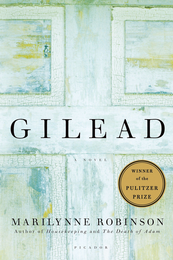A WRITER'S WIT |
My Book World

Robinson writes this novel in a very different but masterful fashion from most contemporary novels. She undertakes to have a third-generation (at least) Protestant minister tell his family’s story to his very young son by way of a letter, reviving a long epistolary tradition in storytelling. It is the kind of novel that wends itself back and forth over the same geographical (from Iowa to Kansas, literally on foot) and temporal (several generations) territories. One must retain part of the information, at least, to make sense of it all; yet Robinson skillfully reminds readers of pertinent facts, and they can uncover more as they continue their journey through the book.
The elderly Rev. John Ames, who has married late in life, is fatally ill and thus wishes to share his life with his young son. Early on, he shares that in his life as a pastor he has written and filed away a large number of sermons:
“Your mother . . . was the one who actually called my attention to the number of boxes I have filled with my sermons and my prayers. Say, fifty sermons a year for forty-five years, not counting funerals and so on, of which there have been a great many. Two thousand two hundred and fifty. If they average thirty pages, that’s sixty-seven thousand five hundred pages . . . two hundred twenty-five books which puts me up there with Augustine and Calvin for quantity” (19).
Another major thread of the narrative has to do with a fellow pastor and friend, a man named Robert Boughton. (One is not sure if the first syllable is pronounced bough as in a tree’s bough, bow as in bow tie, or even buffton or booton.) Robert’s son, Jack, is a bit of a problem in a number of ways I shall not reveal, and because of them John Ames does not trust Jack. But as a matter of putting his faith in action, he finally steps up to help the troubled young man to grow and move on—his own father, Robert, not ever knowing of Jack’s troubled past. I, too, like Edward, am a former Christian, but I find the book explores the topic of spirituality in a manner that is respectful to all parties who may read the book, and that is a feat difficult to achieve.
NEXT FRIDAY: My Book World | Blake Bailey's Literary Biography of Author Richard Yates: A Tragic Honesty



 RSS Feed
RSS Feed